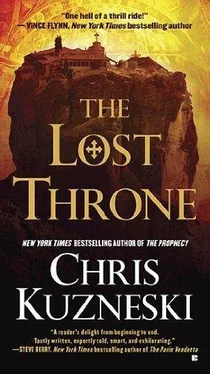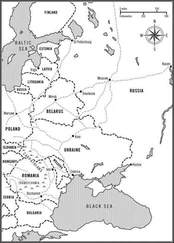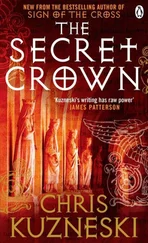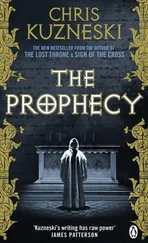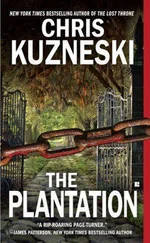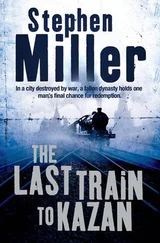Chris Kuzneski - The Lost Throne
Здесь есть возможность читать онлайн «Chris Kuzneski - The Lost Throne» весь текст электронной книги совершенно бесплатно (целиком полную версию без сокращений). В некоторых случаях можно слушать аудио, скачать через торрент в формате fb2 и присутствует краткое содержание. Жанр: Фантастика и фэнтези, на английском языке. Описание произведения, (предисловие) а так же отзывы посетителей доступны на портале библиотеки ЛибКат.
- Название:The Lost Throne
- Автор:
- Жанр:
- Год:неизвестен
- ISBN:нет данных
- Рейтинг книги:4 / 5. Голосов: 1
-
Избранное:Добавить в избранное
- Отзывы:
-
Ваша оценка:
- 80
- 1
- 2
- 3
- 4
- 5
The Lost Throne: краткое содержание, описание и аннотация
Предлагаем к чтению аннотацию, описание, краткое содержание или предисловие (зависит от того, что написал сам автор книги «The Lost Throne»). Если вы не нашли необходимую информацию о книге — напишите в комментариях, мы постараемся отыскать её.
The Lost Throne — читать онлайн бесплатно полную книгу (весь текст) целиком
Ниже представлен текст книги, разбитый по страницам. Система сохранения места последней прочитанной страницы, позволяет с удобством читать онлайн бесплатно книгу «The Lost Throne», без необходимости каждый раз заново искать на чём Вы остановились. Поставьте закладку, и сможете в любой момент перейти на страницу, на которой закончили чтение.
Интервал:
Закладка:

Chris Kuzneski. The Lost Throne
(Payne and Jones – 7)
This is a work of fiction. Names, characters, places, and incidents either are the product of the author’s imagination or are used fictitiously, and any resemblance to actual persons, living or dead, businesses, companies, events, or locales is entirely coincidental.
While the author has made every effort to provide accurate telephone numbers and Internet addresses at the time of publication, neither the publisher nor the author assumes any responsibility for errors, or for changes that occur after publication. Further, the publisher does not have any control over and does not assume any responsibility for author or third-party websites or their content.
http://us.penguingroup.com
ACKNOWLEDGMENTS
Publishing a book requires a collective effort, so I would like to thank a few of the people who helped The Lost Throne see the light of day.
As always, I’d like to start off by thanking my family. Without their love and support, I wouldn’t be the writer (or the person) that I am today.
Professionally, I want to thank Scott Miller, my remarkable agent. Before we teamed up, I couldn’t find a publisher. Now my books are available in several languages around the world. How you pulled off that miracle, I’ll never know. But keep up the great work! While I’m at it, I want to thank Claire Roberts, my main foreign agent, and everyone else at Trident Media who has helped my career during the past few years. Wow, what a great organization.
Actually, I can say the same thing about the Penguin Group. In particular, I’d like to single out my editor, Natalee Rosenstein, and her amazing assistant, Michelle Vega. Working with them has been wonderful. I’d also like to thank Ivan Held and the publishing and marketing wizards at Putnam. I hope this is the beginning of a long relationship.
Next up is my extraordinary friend Ian Harper. Through the magic of e-mail, he gets to read my work before anyone else, and his suggestions and advice are always invaluable. So if anyone’s looking for a freelance editor, let me know. I’d be happy to put you in touch with him.
Last but not least, a big thanks to all the readers, booksellers, critics, and librarians who have read my books and recommended them to others. At this stage of my career, I need all the help I can get, so I would appreciate your continued support.
Okay. Now that I’m done expressing my gratitude, it’s time for the good stuff.
Just sit back, relax, and let me tell you a story. . . .

PROLOGUE
CHRISTMAS DAY, 1890
Piazza della Santa Carità
Naples, Italy
The greatest secret of Ancient Greece was silenced by a death in Italy.
Not a shooting or a stabbing or a murder of any kind-although dozens of those would occur later-but a good old-fashioned death. One minute the man was strolling across the Piazza della Santa Carità, pondering the significance of his discovery; the next he was sprawled on his stomach in the middle of the cold square. People rushed to his side, hoping to help him to his feet, but one look at his gaunt face told them that he needed medical attention.
Two policemen on horseback were flagged down, and they rushed him to the closest hospital, where he slipped in and out of consciousness for the next hour. They asked him his name, but he couldn’t answer. His condition had stolen his ability to speak.
The man wore a fancy suit and overcoat, both of which revealed his status. His hair was thin and gray, suggesting a man in his sixties. A bushy mustache covered his upper lip.
Doctors probed his clothes, searching for identification, but found nothing of value. No papers. No wallet. No money. If they had only looked more closely, they might have noticed the secret pocket sewn into the lining of his coat, and the mystery would have ended there. But as hospital policy dictated, no identification meant no treatment. Not even on Christmas morning.
With few options, the police took him to the local station house, an ancient building made of brick and stone that would shelter him from the bitter winds of the Tyrrhenian Sea. They fed him broth and let him rest on a cot in an open cell, hoping he would regain his voice.
In time, he regained several.
Starting with a whisper that barely rose above the level of his breath, the sound slowly increased, building to a crescendo until it could be heard by the two officers in the next room. They hurried down the corridor, expecting to find the stranger fully awake and willing to answer their questions. Instead they saw a man in a semicata tonic state who was babbling in his sleep.
His eyes were closed and his body was rigid, yet his lips were forming words.
One of the officers made the sign of the cross and said a short prayer while the other ran for a pencil and paper. When he returned, he pulled a chair up to the cot and tried to take notes in a small journal. Maybe they’d get an address. Or if they were really lucky, maybe even a name. But they got none of those things. In fact, all they got was more confused.
The first words spoken were German. Then French. Then Portuguese. Before long he was mixing several languages in the same sentence. Dutch followed by Spanish and Latin. English layered with Greek and Russian. Every once in a while he said something in Italian, but the words were so random and his accent so thick that they made little sense. Still, the officer transcribed everything he could, and before long he noticed some repetition. One word seemed to be repeated over and over. Not only in Italian but in other languages as well.
Il trono. Le trône. El trono.
The throne.
This went on almost for several minutes. Language after language from one man’s mouth. Like the devil speaking in tongues. Then, just as quickly as it started, it stopped.
No more words. No more clues.
The man would never speak again.
Two days later, after he had been identified, newspapers around the globe reported his death. Yet there was no mention of his strange behavior. Nothing about his ramblings or the throne he kept describing. Instead, reporters focused on the colorful details of his life-his wealth, his accomplishments, his discoveries. All the things that made him famous.
Of course, if they had known the truth about his final days, what he had finally found after years of searching, they would have written a much different story.
One of fire, deception, and ancient gold.
One that wouldn’t have an ending for almost two more centuries.
1
PRESENT DAY
Saturday, May 17
Metéora, Greece
The monk felt the wind on his face as he plummeted to his death, a journey that started with a scream and ended with a thud.
Moments before, he had been standing near the railing of the Moni Agia Triada, the Monastery of the Holy Trinity. It was one of six monasteries perched on natural rock pillars near the Pindus Mountains in central Greece. Known for their breathtaking architecture, the monasteries had been built 2,000 feet in the air with one purpose in mind: protection.
But on this night, their sanctuary was breached.
The intruders had crossed the valley and climbed the hillside with silent precision. They carried no guns or artillery, preferring the weapons of their ancestors. Swords stored in scabbards were strapped to their backs. Daggers in leather sheaths hung from their hips. Bronze helmets covered their entire heads except for their eyes and mouths.
Читать дальшеИнтервал:
Закладка:
Похожие книги на «The Lost Throne»
Представляем Вашему вниманию похожие книги на «The Lost Throne» списком для выбора. Мы отобрали схожую по названию и смыслу литературу в надежде предоставить читателям больше вариантов отыскать новые, интересные, ещё непрочитанные произведения.
Обсуждение, отзывы о книге «The Lost Throne» и просто собственные мнения читателей. Оставьте ваши комментарии, напишите, что Вы думаете о произведении, его смысле или главных героях. Укажите что конкретно понравилось, а что нет, и почему Вы так считаете.
